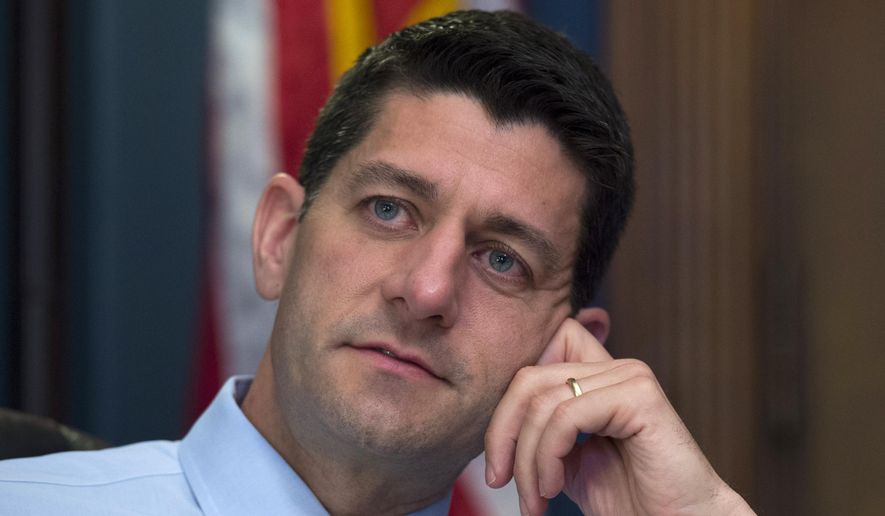Congressional Republicans insist they can still use a fast-track budget tool to repeal all or part of Obamacare, but they’re having to regroup after the Supreme Court’s ruling last month denied them their best chance to pull the trigger.
Some rank-and-file GOP lawmakers had feared their leaders would give up the fight after the justices upheld the Affordable Care Act’s payment of subsidies to customers in all states. Republicans had been banking on the court striking down the subsidies in most states, creating a crisis within the program that would give them leverage to attack the law.
“So we have to retool, now that ’King’ didn’t prevail,” said House Ways and Means Chairman Paul Ryan, Wisconsin Republican, referring to the case, King v. Burwell. “We’re working on that retooling now, and our goal is to use reconciliation for Obamacare.”
Reconciliation is a complex budget tool that allows a bill to avoid a Senate filibuster. Democrats used the tool to help pass Obamacare in 2010.
President Obama would still maintain a veto over whatever Congress passes, and the GOP is unlikely to garner the votes to surmount that hurdle, so some Republicans and fiscal watchdogs wonder if it makes sense to use reconciliation on Obamacare at all.
Rep. Tom Cole, Oklahoma Republican, has argued the GOP should use reconciliation to reform entitlement programs or end the sequester budget cuts, saying he sees “no value in scoring political points against a president who will veto the bill and never be on the ballot again.”
Yet many conservatives said they voted for the fiscal 2016 budget with the explicit understanding that reconciliation would be used to attack Obamacare.
“Republicans would be foolish to abandon opposition to Obamacare,” said Rep. Tim Huelskamp, Kansas Republican, saying it appeared that GOP leaders, without actually saying so, were slow-walking the effort against Obamacare.
A spokesman for House Speaker John A. Boehner, Ohio Republican, insisted repealing Obamacare is a focus.
“All of the discussions on reconciliation have centered around Obamacare, but no final decisions have been made,” spokesman Kevin Smith said Friday. “The leaders will continue to consult with our chairmen and our members on this.”
For his part, Mr. Obama is urging Republicans to lay down their arms after the justices upheld a key portion of his law for the second time in three years.
He chalked up another win Friday, when the Gallup polling group said the uninsured rate fell to its lowest point since the polling company started keeping track in 2008. The rate dropped to 11.4 percent in the second quarter of this year, a 6 percentage-point drop since the end of 2013, or right before Obamacare’s main provision took effect.
Republicans say their fight remains urgent. Insurers are seeking double-digit premium hikes on the law’s exchanges, and constituents complain of unpopular insurance mandates and high deductibles that leave them functionally uninsured.
For now they’ll need to convince the Senate’s referee — the parliamentarian — that dinging Obamacare in some way could decrease, rather than increase, deficits.
It could be a tough needle to thread. Last month, the Congressional Budget Office estimated that scrapping the entire law would increase deficits by $137 billion over the next decade, even after their analysis factored in repeal’s benefits to the economy.
“We’re trying to figure out what all we can do,” Mr. Ryan said, “given the constraints of reconciliation.”
Budget instructions gave specific Senate and House committees until July 24 to report back the ways each of them could reduce the deficit by $1 billion over the next 10 years. But the instructions remain in place until they’re supplanted by a new budget, so the deadline is virtually meaningless.
Five years ago, Democrats took their final action on reconciliation 330 days after their fiscal 2010 budget passed in April 2009.
Mr. Huelskamp said Democrats deserve credit for working the rules to their advantage, and it’s time for the GOP to present their own health plan to voters.
“What can we do better?” he said. “Right now, most people don’t know.”
• Tom Howell Jr. can be reached at thowell@washingtontimes.com.




Please read our comment policy before commenting.